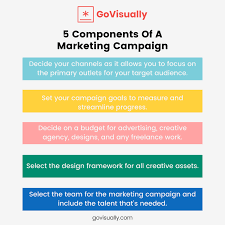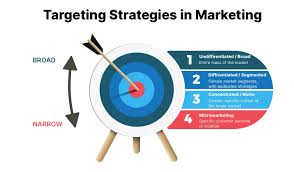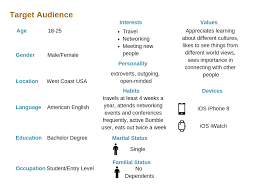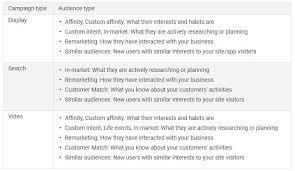Mastering the Art of Understanding Your Target Audience: A Guide to Effective Marketing Strategies
The Importance of Understanding Your Target Audience
One of the key elements of a successful marketing strategy is understanding your target audience. By gaining insights into who your audience is, what they need, and how they behave, you can tailor your messaging and offerings to resonate with them effectively.
Identifying Demographics
Start by identifying the demographics of your target audience. Consider factors such as age, gender, location, income level, education, and occupation. Understanding these demographic characteristics can help you create targeted campaigns that appeal to specific segments of your audience.
Psychographic Profiling
Go beyond demographics and delve into psychographics to understand the attitudes, values, interests, and lifestyles of your target audience. This information can provide valuable insights into their motivations and preferences, enabling you to create more personalised and engaging marketing messages.
Behavioural Analysis
Analyse the behaviour of your target audience to understand how they interact with your brand, what influences their purchasing decisions, and where they are in the buyer’s journey. By tracking their online activities, social media engagement, and purchase history, you can tailor your marketing efforts to meet their needs at each stage of the customer journey.
Creating Buyer Personas
Developing detailed buyer personas based on demographic data, psychographic insights, and behavioural analysis can help you visualise and empathise with your target audience. By creating fictional representations of your ideal customers, you can better understand their needs, challenges, goals, and preferences.
Personalising Marketing Messages
Use the insights gained from understanding your target audience to personalise your marketing messages across various channels. Tailor your content to address specific pain points, offer relevant solutions, and connect with your audience on a deeper level. Personalisation can enhance customer engagement and drive conversions.
Adapting Strategies for Different Segments
Recognise that not all members of your target audience are the same. Adapt your marketing strategies to cater to different segments within your audience based on their unique characteristics and preferences. This approach allows you to maximise the impact of your campaigns by addressing diverse needs effectively.
Evaluating Feedback and Data
Continuously monitor feedback from your target audience through surveys, reviews, social media interactions, and website analytics. Use this data to refine your understanding of their preferences and behaviours over time. By staying attuned to changes in consumer trends and feedback loops from customers,
you can adapt your strategies accordingly.
In Conclusion
Understanding your target audience is essential for developing a successful marketing strategy that resonates with potential customers. By gaining deep insights into who they are,
what drives them,
and how they engage with brands,
you can create more meaningful connections,
drive engagement,
and ultimately achieve business success.
Investing time
and resources in understanding
your target audience will pay off in terms
of increased brand loyalty,
customer satisfaction,
and long-term growth.
Remember:
knowing
your customers inside out
is key
to building lasting relationships
and driving sustainable business growth.
9 Essential Tips for Understanding Your Target Audience in the UK
- Conduct thorough market research to identify your target audience.
- Create buyer personas to represent different segments of your audience.
- Understand the demographics, psychographics, and behaviour patterns of your audience.
- Engage with your audience through surveys, interviews, and social media interactions.
- Analyse data such as website analytics and sales trends to gain insights into your audience.
- Monitor feedback and reviews to understand what resonates with your audience.
- Stay updated on industry trends and changes in consumer preferences.
- Personalise your marketing messages to cater to the specific needs and interests of your audience.
- Adapt your strategies based on feedback and evolving characteristics of your target audience.
Conduct thorough market research to identify your target audience.
Conducting thorough market research is a crucial step in understanding your target audience. By delving into market trends, consumer behaviours, and competitor analysis, you can gain valuable insights that help you identify and define your target audience effectively. This research allows you to uncover demographic information, psychographic profiles, and behavioural patterns that shape your audience’s preferences and decision-making processes. Armed with this knowledge, you can tailor your marketing strategies to resonate with your target audience and create compelling campaigns that drive engagement and conversions.
Create buyer personas to represent different segments of your audience.
Creating buyer personas is a crucial step in understanding your target audience effectively. By developing detailed representations of different segments within your audience, you can visualise their unique characteristics, preferences, and behaviours. These personas enable you to empathise with your ideal customers, gaining insights into their needs, challenges, and aspirations. By creating buyer personas, you can tailor your marketing strategies to address the specific requirements of each segment, leading to more personalised and engaging campaigns that resonate with your audience on a deeper level.
Understand the demographics, psychographics, and behaviour patterns of your audience.
To effectively connect with your target audience, it is crucial to delve into their demographics, psychographics, and behaviour patterns. By understanding the demographic characteristics such as age, gender, location, income level, and education of your audience, you can tailor your marketing strategies to resonate with specific segments. Exploring the psychographics – including attitudes, values, interests, and lifestyles – provides valuable insights into their motivations and preferences. Additionally, analysing the behaviour patterns of your audience helps you comprehend how they interact with your brand and make purchasing decisions. This comprehensive understanding enables you to create targeted campaigns that engage and resonate with your audience on a deeper level.
Engage with your audience through surveys, interviews, and social media interactions.
To truly understand your target audience, it is essential to engage with them actively through various channels such as surveys, interviews, and social media interactions. By seeking feedback directly from your audience, you can gain valuable insights into their preferences, needs, and behaviours. Surveys and interviews provide in-depth information that can help you tailor your marketing strategies effectively. Additionally, engaging with your audience on social media allows for real-time interactions and feedback, fostering a sense of community and building stronger relationships with your target demographic. By actively listening to your audience through these channels, you can refine your approach and better meet their expectations, ultimately leading to more successful marketing campaigns.
Analyse data such as website analytics and sales trends to gain insights into your audience.
To truly understand your target audience, it is crucial to analyse data sources such as website analytics and sales trends. By delving into these metrics, you can uncover valuable insights into the behaviour and preferences of your audience. Website analytics can reveal how visitors interact with your site, what content they engage with the most, and where they may drop off. On the other hand, sales trends provide information on which products or services are popular among your audience and what factors drive their purchasing decisions. By leveraging this data effectively, you can tailor your marketing strategies to better meet the needs of your audience and drive meaningful engagement and conversions.
Monitor feedback and reviews to understand what resonates with your audience.
Monitoring feedback and reviews is a valuable tip for understanding your target audience. By paying attention to the comments, suggestions, and criticisms shared by your audience, you can gain valuable insights into what resonates with them. Analyzing feedback allows you to identify trends, preferences, and pain points that can guide your marketing strategies and messaging. This proactive approach not only helps you address customer needs effectively but also demonstrates your commitment to listening and responding to their feedback, ultimately building stronger relationships with your audience.
Stay updated on industry trends and changes in consumer preferences.
To effectively understand your target audience, it is crucial to stay updated on industry trends and changes in consumer preferences. By keeping abreast of the latest developments in your industry and monitoring shifts in consumer behaviour, you can adapt your marketing strategies to meet evolving needs and expectations. This proactive approach not only helps you anticipate market changes but also enables you to tailor your messaging and offerings to resonate with your target audience effectively. Stay informed, stay relevant, and stay connected with your audience to maintain a competitive edge in today’s dynamic business environment.
Personalise your marketing messages to cater to the specific needs and interests of your audience.
To effectively engage with your target audience, it is crucial to personalise your marketing messages to align with their specific needs and interests. By tailoring your content to address the unique preferences and challenges of your audience, you can create a more meaningful connection that resonates with them on a deeper level. Personalisation demonstrates that you understand and value your customers, leading to increased engagement, brand loyalty, and ultimately driving conversions. By crafting messages that speak directly to the individual needs of your audience, you can create a more impactful and successful marketing strategy.
Adapt your strategies based on feedback and evolving characteristics of your target audience.
To effectively understand your target audience, it is crucial to adapt your strategies based on feedback and the evolving characteristics of your audience. By listening to feedback and analysing changing trends in consumer behaviour, you can refine your approach to better meet the needs and preferences of your audience. This proactive adjustment of strategies ensures that your marketing efforts remain relevant and impactful, ultimately leading to stronger connections with your target audience and improved business outcomes.












